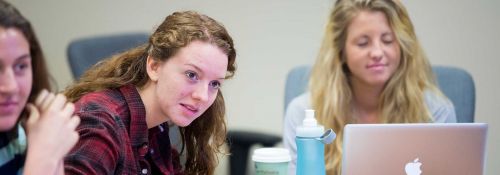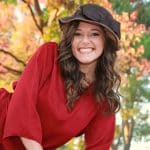
Bridging the Gap: Science and the Theology of the Body
Written by Jo Kroeker
On registration day, Theology of the Body fills up in minutes. It is one of the most popular classes on campus and the brainchild of Professor of Philosophy and Religion Nathan Schlueter.
Back in 2014, Dr. Schlueter told an interested student he would only teach the class if fifteen students signed up. Sixty people expressed interest. Now he offers it each semester, attracting students from every discipline at Hillsdale College.
Despite its 400-level listing, dense readings, and frequent quizzes, science students pull themselves from the deep waters of upper-level labs to contemplate the Catholic understanding of the body, sexuality, marriage, and morality. In combination, the biological and chemical, the philosophical and theological paint a more perfect picture of personhood: one that informs the ethical approaches of students pursuing medicine and scientific research.
Senior biology and Spanish major Angela Bonvissuto said she aims to work in healthcare and loves studying the body (her favorite classes are gross anatomy and anatomy). For her, Theology of the Body is an opportunity to approach the body from a theological, rather than biological and mechanistic, standpoint. Now she can connect philosophical claims to scientific explanations of the body’s inner workings.
For example, Angela’s theology readings claim physical touch binds two people in a philosophical context. From science, she also knows that the body releases a bonding hormone called oxytocin. She said knowing both reasons helps her see a purposefulness in God’s creation. In fact, her initial thought after finding such a connection was, “Wow, God is really smart.” Seeing science and theology work in concert to portray the fullness of personhood demonstrates the beauty of a person in addition to reflecting a purposeful Creator.
“It just helps me see the beauty,” she said. “I feel like just looking at the scientific side of it, it’s a glimpse into how beautiful a person is, but it’s not complete unless I have both sides of it.”
This deeper understanding of the body itself, as a being more complex than a mere mechanism, teaches Angela how to have a holistic approach when treating patients.
“If you’re going to treat someone, heal them, you have to be able to approach it from all sides. A lot of times, somebody’s physical symptoms are very related to what’s going on spiritually and psychologically.”
Stevan Lukich, a senior studying biochemistry with his eyes set on medical school, also views the class as completing his picture of what a person is.
“You can have a really good understanding of the mechanics of the body, but that’s totally leaving out the most important part of being human, which is the personhood,” Stevan said. “We have thoughts and we have feelings and we have emotions, and we can reason through them and reach conclusions. Those are all related to the body in a scientific way—and a theological way as well.”
Stevan remembered a passage he highlighted from Love and Responsibility, a book assigned in the class. In it, John Paul II says life, especially human life, has inherent value and dignity because we’re created in the image of God. Stevan concluded that having a theological grounding for his understanding of human life informs his ethics as a scientist.
“It provides the framework to keep science from doing things science shouldn’t be doing, but that science can do without those principles and understanding of what it means to be human,” he said.
The class has also helped senior biochemistry major Anna Goodwin, who spends her summers working in a government-funded wet lab, to bridge the apparent gap between Christianity and the sciences.
“Do your science like you do your science, your religion like you do your religion, and the truth will come out in the end,” she said.
Anna sees a connection between the truths of biochemistry and those of John Paul II’s philosophical teachings because both are grounded in experience. In seeing such a connection, she can embrace fearlessly the truths both disciplines reveal.
“You can’t really understand the book outside of experience,” she said. “All of this philosophy…you shouldn’t be afraid of it, and you shouldn’t be afraid of the truth in it, because your experience will always point to this truth. It’s the same with science. There is one Truth, so you shouldn’t be afraid of it and anything it tells you.”
 JoAnna Kroeker (but everyone calls her Jo), ’19, exchanged flip flops and eternal sunshine in Fresno, California, for snow-boots and school at Hillsdale, where she studies French and journalism. Former Opinions and current Features Editor of the Hillsdale Collegian, she gives thanks for the coffee and brown sugar Pop Tarts that make school and a weekly newspaper possible. When she’s not writing, she’s tutoring other writers or thinking about writing while doing yoga, baking, or reading.
JoAnna Kroeker (but everyone calls her Jo), ’19, exchanged flip flops and eternal sunshine in Fresno, California, for snow-boots and school at Hillsdale, where she studies French and journalism. Former Opinions and current Features Editor of the Hillsdale Collegian, she gives thanks for the coffee and brown sugar Pop Tarts that make school and a weekly newspaper possible. When she’s not writing, she’s tutoring other writers or thinking about writing while doing yoga, baking, or reading.